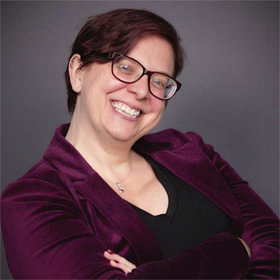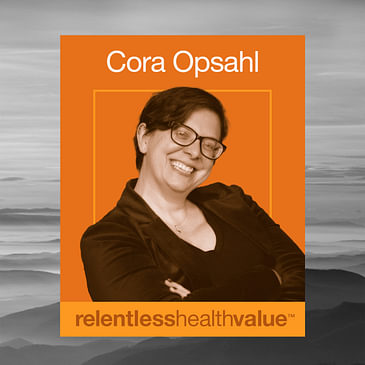For a full transcript of this episode, click here.
Why did I decide to encore this episode where Cora Opsahl from 32BJ spends 29 minutes talking about the importance of getting your data if you are an employer or a union health fund? Let me quote Jeff Hogan with some light edits here. Jeff wrote about the “outsized role” that employer data and intentional analytics can and will play. This is emerging and a must-have. The show with Andreas Mang (EP419) from three weeks ago, the show with Dan Mendelson (EP385), the one with Mark Cuban and Ferrin Williams (EP418) … everything that has been talked about in all of these shows and more is gonna be hard to do without having the data so you know what’s going on. But I will let Cora Opsahl explain far more succinctly than I can here.
One more note before we dive in here: After you listen to this show, you might want to go back and listen to episode 373 with Cora—and that one is entitled “How to Kick a Big Hospital Out of Your Network”—because this is one of the things that 32BJ did when it got its data. 32BJ realized that if it kicked out the really expensive hospital from their network, it would (and did!) save $35 million. Kicking this one hospital out of its network enabled the union to get its biggest wage hike in however many years, and also the employers employing union members got a premium holiday and did not have to pay into the health fund for a few months.
Imagine if they didn’t have this data and realized the millions and millions of dollars being siphoned out of the plan by this one hospital charging way too much. It’s just crazy how many employers or unions wind up becoming imprudent fiduciaries because they just don’t have the data to know better. But I’ll tell you who is realizing it: class action attorneys.
In this healthcare podcast, I am speaking with Cora Opsahl, who directs the 32BJ Health Fund.
Important to know about Cora’s background is this: In previous roles, she’s worked deep in the inner workings of the healthcare industry. So, she came to 32BJ armed with a BS meter that is finely tuned, which is, unfortunately, an essential skill for anyone trying to help the patients and members relying on them to successfully navigate the healthcare industry.
This conversation gets into everything that the 32BJ Health Fund does with their data. They have lots of data. They demand it. So, besides kicking out overly expensive health systems from their network, here’s other things that 32BJ is currently doing with their data and which other employers and unions may get a few ideas from. If you have the data, you (like 32BJ) can use it to:
- Make smart benefit decisions that are validated, not just guesses. Before you decide to do something (add a wellness program etc), be able to model it accurately for how much it will actually cost you—which, spoiler alert, is most of the time not what the vendor will estimate. You have way more data than the vendor does, so you can certainly use it to great effect in this way.
- Make sure that the right members are being communicated with so that benefit designs are successful. As Ashleigh Gunter said in episode 368, success when changing benefit designs has a lot more to do with communication than many realize.
- Create dashboards for leadership that may show trend lines, for example, which could be very helpful to ensure that the fund doesn’t run out of money etc … little things like that.
- Figure out how much the fund is spending on various procedures and where. There’s all this talk right now about the crazy variability of prices for the same exact service in the same local market. At one hospital, a colonoscopy could literally cost $10,000; and in another hospital—same quality, same basically everything—that same colonoscopy will be $2000 or $3000. I mean, there’s a 500% delta or something in some of these cases.
- Ensure that if a vendor said they were going to do something, that they are actually doing it. This is especially meaningful for point solutions because of the whole squeezing the balloon thing. I can save money in a silo, and you won’t realize that those dollars are getting transferred elsewhere unless you are doing your own math. This is a big deal if you start thinking about how pharmacy benefits are typically siloed from medical benefits. So, if I’m a pharmacy benefit manager, I can talk about how much I’m saving by denying patients drugs without consideration of the medical downstream implications of that.
- Ensure you’re not paying a bill and writing a check for more than the bill was for, which is weirdly common. There’s a whole show with Dawn Cornelis (EP285) about this.
- 32BJ has an engineering team that is creating an app to help members navigate to great doctors with fair prices.
All of these things roll into basically three categories:
1. Cutting wasteful spending and finding fraud
2. Making smart benefit decisions
3. Being able to see trends and forecast the future, which is really helpful for financial solvency etc
As Cora Opsahl says, “I think we [all can] recognize [that] you [cannot] make smart … decisions and be a fiduciary of [a] fund without having [data].”
This whole conversation has been really a big bright spot for me and will provide hope, I think, for any employer/union who is seeking ways to protect their members and patients, the ones on their plans and therefore under their aegis and whom they have a fiduciary responsibility to look out for. 32BJ represents about 200,000 members. They are mostly in residential and commercial real estate—so, for example, your doormen, your maintenance workers, your security, your cleaners, amongst others. Members are in about 11 states, but a lot of them are in the New York City metro area. These union members who are in the fund work for over 5000 different employers. The 32BJ Health Fund has zero-dollar premiums. Wowza on that point—that’s a huge benefit.
Also mentioned in this episode are Jeff Hogan; Andreas Mang; Dan Mendelson; Mark Cuban; Ferrin Williams, PharmD, MBA; Ashleigh Gunter; Dawn Cornelis; and Wayne Jenkins, MD.
You can learn more at 32bjhealthfundinsights.org.

Prior to joining the 32BJ Health Fund, Cora spent 12 years at Express Scripts, a pharmacy benefit manager, where she held a variety of roles, including with Medicare Part D, strategy and acquisitions, operations, and account management. She holds an MBA from Saint Louis University.
06:53 How much data does 32BJ Health Fund have, where do they get it, and how do they use it?
08:52 How did 32BJ Health Fund successfully demand their data from 100% of their vendors?
09:42 “We feel it’s really important that we own this information ourselves.”
10:05 “It always concerns me—if a vendor doesn’t want to give you the information, what are they hiding?”
10:32 “It’s not just getting the data; it’s then using the data.”
13:41 “Without data, you’re really just taking a guess; and guesses are never gonna get you where you need to go.”
15:19 EP285 with Dawn Cornelis.
15:40 Is the cost of creating a data analytics team worth the cost savings of those data discoveries?
19:03 “The use of data has really built our knowledge.”
20:52 “It’s really important to us that as we make benefit decisions, we’re doing it smartly.”
25:27 EP358 with Wayne Jenkins, MD.
25:38 How is 32BJ Health Fund making their data knowledge actionable?
28:11 “If we can figure out how to make telehealth accessible … there may be an opportunity for telehealth … to upset some of these … monopoly systems or low-choice options.”
30:22 “It’s really easy to think that we can solve this problem through benefit design … but in the end … it’s the price.”
You can learn more at 32bjhealthfundinsights.org.
Recent past interviews:
Click a guest’s name for their latest RHV episode!
Jodilyn Owen, Ge Bai, Andreas Mang, Karen Root (Encore! EP381), Mark Cuban and Ferrin Williams, Dan Mendelson (Encore! EP385), Josh Berlin, Dr Adam Brown, Rob Andrews, Justina Lehman




